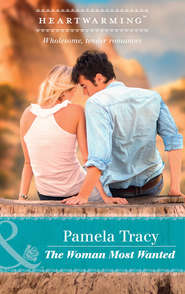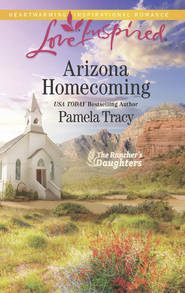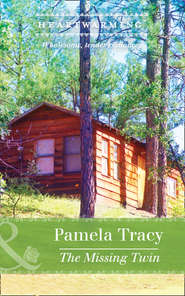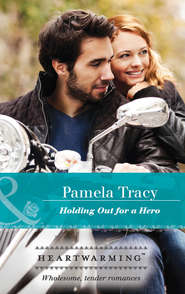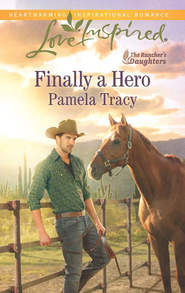По всем вопросам обращайтесь на: info@litportal.ru
(©) 2003-2024.
✖
Small-Town Secrets
Автор
Год написания книги
2019
Настройки чтения
Размер шрифта
Высота строк
Поля
Copyright (#litres_trial_promo)
CHAPTER ONE (#ulink_3b9b4291-d493-55c9-bd49-49680879036b)
THERE WERE TWO things Yolanda Sanchez didn’t want to see in her somewhat restored Queen Anne Victorian, whose ground floor now housed the Twice Told Tales used bookstore.
One, a leaky roof. Leaks were bad, very bad, for books. But as she was a worrier, she’d already thought about the roof and installed a new one. Now a roof leak shouldn’t be a problem, especially since her bookstore took up the first floor.
The second threat was fire. Fire was bad, very bad, for books. That’s why the puffs of smoke floating and fading in the air near the history room couldn’t possibly be good news.
Yolanda quickly set the three books she’d been carrying to the children’s section on the nearest empty shelf. In her haste, she misjudged how much room she had and two of the books tumbled to the floor. She ignored them and hurried through the rows of popular fiction, self-help and romance.
She’d been in the history and nonfiction room just this morning doing inventory. Some of the books there were so old she’d put them in Ziplock bags and was considering putting them on display next to the cashier instead of keeping them in their genre area. They were rare and a book lover’s dream, with brittle covers, ragged corners and yellowing pages. They were the most precious of firewood.
No! Not on her watch!
She rounded a corner and stopped so abruptly that her shoes made a squeaky sound. The noise didn’t seem to disturb the room’s occupant. Amidst the books was a tiny lady wearing a light brown sweater and dark brown skirt. Her clothes—right down to her brown, flat shoes—looked dull and faded next to the bright purple walls of the history room. The expression on the woman’s pale face was serious. Without blinking, her bright blue eyes perused the shelves, peering closely to read the titles that even Yolanda couldn’t make out on a good day without the use of her glasses.
“We’re not open yet,” Yolanda sputtered.
What she’d wanted to say but couldn’t seem to form the words was, “Who do you think you are, smoking a cigarette in the middle of my used bookstore?”
The woman reached up to finger a strand of pearls around her neck. “I realized that when I arrived and there was no one to help me.”
The judgmental tone didn’t inspire Yolanda to feel generous. “The sign on the door clearly states that we’re not open yet.”
Obviously, Yolanda needed to work on her assertive nature because the woman merely shrugged and said, “I’m looking for a book about the history of this town.”
Oh, yes, this was a seasoned smoker, with the telltale throaty voice. Yolanda gritted her teeth—customer relations and all that—shook her head and gently suggested, “If you want something immediately, you’ll need to go to the town museum or one of the gift shops on Main Street. We don’t open until Friday.”
The woman’s expression remained disapproving. She didn’t seem bothered one bit by the fact that the used bookstore wasn’t open and that she didn’t belong there. Instead of looking chastened, like Yolanda expected, she looked determined. She inquired, “Do you have other books about Scorpion Ridge? Besides what is in this room. Old books, I mean, perhaps written by someone long ago who lived in this town but who only published for themselves or their family. I’m not finding the book I want. I’ve been to the little museum. They don’t have it. It’s a particular one, probably written a little more than a hundred years ago. I’m looking for proof.”
“Proof of what?” Yolanda asked.
“Just you never mind.”
What a curmudgeon. Unhappiness and anger oozed from her.
But there was something else in her eyes, too, an emotion so fleeting that Yolanda almost didn’t see it. This woman had suffered loss and never recovered. Yolanda gentled her response. “I’m still working on this room. You need to come back some other time. I’ve not quite unpacked...”
Just like that, Yolanda’s eyes teared. And not from the smoke. She love, love, loved that she was living her dream, but she was struggling with all the changes, not only to her way of life but also to her way of thinking. She was living in her grandmother’s house. The history section of Twice Told Tales was located in what used to be her grandmother’s bedroom. Now Rosi Acura, who told everyone she was a little over seventy but who really was quite a bit over eighty, lived in a retirement group home close to downtown.
The home’s director had a bit of a crush on Rosi. Yolanda figured he believed the woman really was in her seventies.
“I love being at the home,” Gramma Rosi kept telling Yolanda. And Yolanda didn’t doubt that she did. Rosi’s best friend lived in the room next to hers. The group home’s caretaker—who had been Yolanda’s history teacher way back when—enjoyed squiring her grandmother around on any errand she wanted. Plus, a van took her shopping, to bingo and once a month on some sort of touristy excursion. That, combined with helping Yolanda’s new venture, did a lot to distract Rosi from the grief of losing her oldest child.
A year ago, Yolanda’s mother died, quietly, without pain.
Yolanda’s mom, Trina Sanchez, had invested wisely and had lived frugally. She’d left six figures, all to Yolanda. Yolanda would rather her mother have taken her to Disneyland when she was ten, to the beach once or twice, or even a few excursions to the big city of Phoenix and a movie night or something. Instead, Yolanda had spent many hours alone in the house while her mother worked. Mom had been adamant about the security of savings and worried about every penny spent.
Maybe at the end, though, her mother had reconsidered her practical philosophy. Because a stipulation in her will emphasized that the inheritance could only be used to build a dream.
Possibly because Trina had not fulfilled her own dreams?
“This room looks quite full.” The raspy voice snapped Yolanda out of her reverie. The woman’s eyes swept the room. Her lips pursed, as if she didn’t like what she saw. “Do you have anything in storage? I’d be glad to help you unpack. Or perhaps you’ve a special place for your really old books?”
Yolanda straightened to her full height, which put her eye to eye with the petite woman’s just over five-foot frame—and that counted the curly top of the woman’s gray hair. In her most commanding small-business-owner voice, Yolanda said, “Ma’am, we’re not open, and even if we were, smoking is not allowed on the premises.”
Finally, the woman’s expression changed but only marginally. Her red lips pursed when she glanced at her cigarette as if just noticing it. She then looked around for a place to put it out. As the ash was almost at the length where it would soon drop to the floor, Yolanda reached for the bright yellow coffee cup she’d left on the windowsill this morning. It was from a set of four that her grandmother had given her. Butter yellow with an orange daisy painted on it, three cups had survived a household of kids.
“I can search through the trunks in the attic,” the woman volunteered, giving the cup a disdainful look before dropping her lipstick-tipped cigarette into the coffee cup as if it were a gold-plated ashtray meant just for her. “It would have to be now, though.”
“That won’t be necessary,” Yolanda said. Only one trunk of books remained to be unpacked from her Gramma Rosi’s attic, where the remnants of Yolanda’s ancestors were stored, gathered by her family for the last hundred years and maybe even earlier. Yolanda wasn’t sure. The books in the final trunk appeared to be as old as the house and just as precious.
Used books were the lifeblood of Yolanda’s new business. That the first ones shelved had been from her attic made the venture all the more special. Besides yard sales, friends simply giving her their already read offerings, and buying the surplus from a used bookstore in Phoenix, Yolanda had also snagged more than five hundred books from the town of Gesippi, just an hour to the north. Its library had closed just two weeks ago, and Yolanda had purchased a good deal of their inventory, but she hadn’t had time to go through all her purchases. They were in the carriage house.
For a moment she thought the woman would argue, so Yolanda continued. “We’re right on schedule for the opening, and I have plenty of volunteers. Come back on Friday.”
The woman gave the shelves one last perusal. “Did you put any books on reserve?”
“We’re a used bookstore, not a library.” Yolanda’d been patient long enough. “Who are you?”
“I’m staying with relatives right now,” the woman said. “Maybe you’ve heard of Chester Ventimiglia.”
Yolanda didn’t know a Chester, but she did recognize the Ventimiglia name. Richard Ventimiglia and another man named John Moore had been the town’s founding fathers. There were still a few Moores in Scorpion Ridge, but the Ventimiglias had long since left or died out.
“I do know the name, but...” Yolanda’s words tapered off as somewhere in the old Victorian something clattered to the floor, the sound as effective as a fire alarm. Yolanda stepped from the room, listening. Maybe the old woman wasn’t the only one snooping in the used bookstore before the grand opening. In the silence she moved closer to one of the vents where now she could clearly hear talking—singing?—and relaxed when she recognized Adam’s voice. He’d said he’d be by later, something about replacing the hinge on one of the saloon doors he was hanging for her.
“This isn’t really yours,” came a throaty whisper.
When Yolanda turned back, the woman was gone.
* * *
FOR SUCH A little thing, Yolanda Sanchez sure made a lot of noise. So much so that Adam Snapp stopped his singing. Last time he’d honored the Beatles with his limited musical talent, she had poked fun of his voice. Poking fun at him was something she’d done since fifth grade, when she’d noted that he’d worn two different colored socks to school by accident. Used to be, he’d tease her back, saying something like, “Across America, socks are standing up and shouting, ‘We don’t have to all be the same.”’ He’d said it loudly and made sure there was an audience. Yolanda hadn’t seemed fazed.
Today he wanted to quip, “Better to sing off-key than not to sing at all.”
For the last few months, though, his ability to joke his way through life had taken a severe hit. Which was why when his father got sick and the family business went from profitable to precarious, it had been a simple decision to come home and help. He’d not told anyone the mess he’d made of his once-in-a-lifetime opportunities.
Straightening the toolbox he’d accidentally stumbled over, Adam listened to Yolanda’s stomping and huffing. Occasionally, she’d call out, “Ma’am?” Something or someone had her riled; he was glad it wasn’t him.
Picking up a Phillips screwdriver, he held the door level while screwing the pivot hinge into the doorjamb. The blank surface beckoned him but only for a moment. Personally, he didn’t think saloon doors belonged in this late-nineteenth-century Queen Anne. And they were a ridiculous choice to separate a private office from a place of business. She’d get no privacy.
She, however, thought they were pretty.
He reminded himself that he’d signed on to help her complete general handyman duties and to follow her directions about decorative shingles and dormers and enclosed breezeways. His job was not to tell her how she could make the two-story Victorian even more authentic and artistically pleasing.
The house was her canvas, not his.






